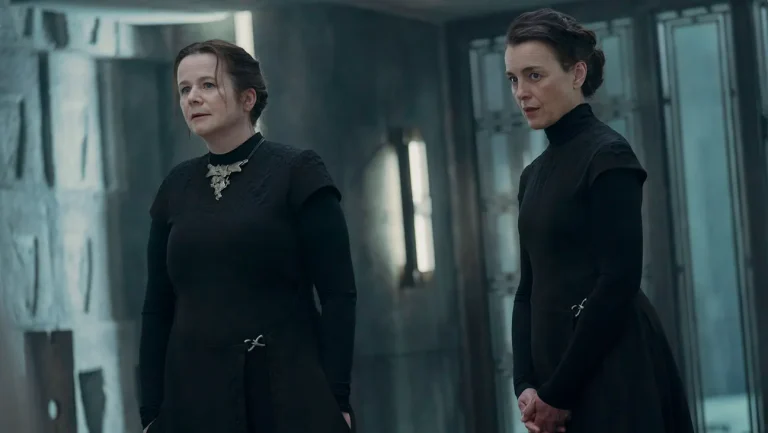
@Courtesy of HBO/MAX
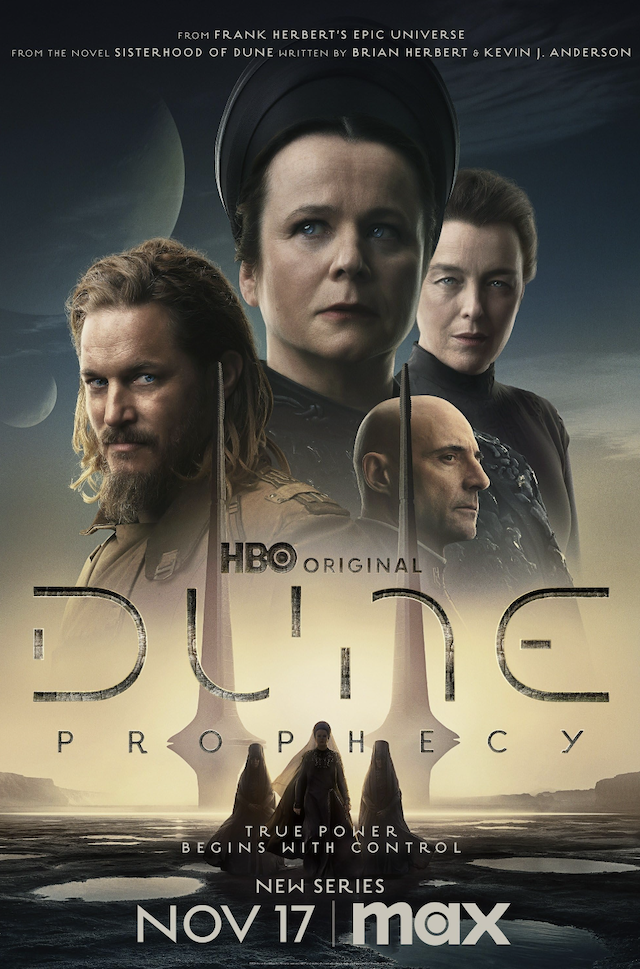
Q: The series is based on the book The Sisterhood of Dune, but it takes place 30 years after the book. How did that give you a lot of creative freedom in what you were shaping for this show?
Alison Schapker: Yes, our series is inspired by “Sisterhood of Dune” which is a novel by Brian Herbert and Kevin J. Anderson. In that novel, they examine the rise of the Bene Gesserit and also the origin story of the Second Mother Superior Valya Harkonnen and her sister Tula. We are actually telling a portion of our story in that time period. We’re interested in Valya Harkonnen’s whole lifetime, looking at her upbringing and how she came to the Sisterhood in one aspect of our series. In the other time period of our series, we’re seeing Valya as a person who has grown the power of the Sisterhood, who is in charge, who is facing a crisis. So we’re toggling between two time periods: one that tethers us to the books very closely, and one that allows us to create. We did that in conjunction with the Herbert Estate, very carefully and respectfully of the world built in the novels. It was exciting to have some room to adapt for television.
Q: Desire for power creates so many dynamics in the show, but also causes a lot of distrust and conflict amongst its characters. How did you approach constantly looking at the balance of power in the way it is shifting in this series?
Jordan Goldberg: The beautiful thing about Frank Herbert’s Dune, is the moral ambiguity of all the characters. At some point you’re dealing with a hero and pretty soon they become the villain and vice versa. What’s interesting about all of these characters is that in our story, they are 100 years removed from the great machine wars. Humans have just been liberated from millennia under the influence of machines. They’re now controlling their own destinies. But as Frank Herbert used to say, there’s always an uncertainty out there that you can’t account for. There are going to be organizations and groups that want to control things to make themselves less fearful of that. There’s an emotional reason to control everything, to control the future. And that causes conflict between all these people who have different schemes at play.
Q: Emily, your character has a real hardness to her exterior, but through her backstory we get to learn a lot about the genesis of where this is built from. So how did her backstory in the scripts help you to develop her?
Emily Watson: I was helped by Jessica Barden. It’s absolutely a gift as an actress to have somebody play your younger self. There is a moment when Valya’s heart, further down the line, just froze. Everything she does is fueled by rage and a sense of vengeance. Then she was spotted by a charismatic cult leader who said: “I see you. You’re very powerful. You’re very special. Very talented. Come and help me shape the future of mankind.” And that’s an incredibly dangerous, enabling thing to do to someone who is essentially a persona fueled with rage. I think being an actor, you have to be a bit of an idiot, really. And there’s a part of you that isn’t lying because you actually kind of believe it. That’s how you can do it. Sometimes you forget to tell yourself to stop. It’s like slightly abandoning your sense of reality.
Q: Olivia, your character is softer and more empathetic. And yet she also has a real fortitude to her inner strength that she’s able to lean on when she feels it’s justified. How did you balance those two sides of her?
Olivia Williams: Playing a younger sister, being a younger sister when your older sister has occupied the full of sound and fury position, you internalize and keep your rage inside, you keep it quiet. But watch out for the quiet ones. She’s a science nerd, the way she finds eliminating her enemies is efficient and quiet, but extremely effective. She’s also troubled by her conscience. But does it make you a better person if you cry while you’re killing people?
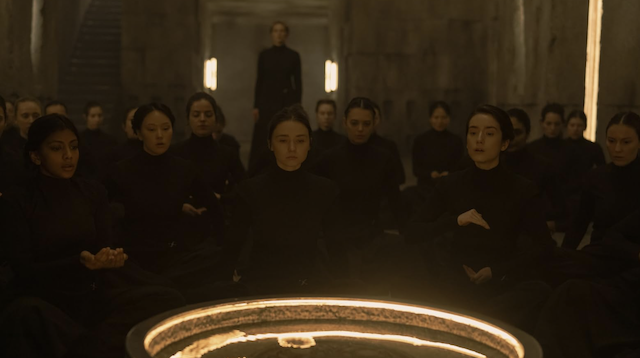
@Courtesy of HBO/MAX
Q: What do you think creates the decades spanning appeal of the Dune series?
Alison Schapker: The Dune universe is so vividly realized. It’s so visceral and specific, deep and provocative. It has all the hallmarks of great storytelling because it leads you through an imagination of the future that is very unique. This notion that we’re imagining a future where technology that we’re familiar with today has been banned, and people are rebuilding humanity and asking themselves: “What does it mean to be human?” is a fascinating place to set a story. You’re led through by these iconic characters who just take you on the journey. It’s a classic, one of the most influential science fiction works ever written. To be part of any corner of the Dune universe is a tremendous privilege.
Q: What do you think creates that appeal?
Emily Watson: When Olivia and I got the part, we went to the National Portrait Gallery in London and we sat in front of the portraits of Elizabeth the First, Mary Queen of Scots, Bloody Mary, Lady Jane Grey, all those women who lived in that terrifying time in British history where it was really a police state. Everybody wanted to kill or marry you. Both of those were a route to power. But the received notion that we have, that is a glorious era of English history is entirely because the narrative was utterly controlled. And that’s what the Bene Gesserit do, they say: “We can discern truth from lies. We can plant stories. We can make people think they’re in charge when we’re in charge, or we can diminish their power. We can fake attacks. We can do all kinds of things that will change the balance of power.” That has such parallels in how the political spectrum operates today. I find that fascinating.
Olivia Williams: Someone said: “Why haven’t you ever acted together before?” I was like: “Find me a script where there’s a part for two 50 year old women with equal status in the same story.” I have to thank Alison for allowing me to act with Emily, finally. We actually met in the last millennium, which sounds a bit “Dune-y”, at the Royal Shakespeare Company.
Jordan Goldberg: This is a show about the Sisterhood, but the person who’s in charge of the Sisterhood is a Harkonnen. We all think that they are just vile and evil, then we get to go into that story a little more and see that it’s not what you thought it was. Maybe there’s more tragedy which caused these misconceptions about who they are. But still, she’s a Harkonnen and they do things very ruthlessly. We’ve seen male Harkonnens do things very ruthlessly, and now we’re going to see our female Harkonnens and they’re just as badass.
Q: The language in the Dune novels, especially in the Frank Herbert’s novels, is very dense. Most of the time, the characters actually use dialogs in order to hide something or to deceive the other characters. Can you talk about the process of adapting these dialogs to another medium and to a more contemporary audience?
Alison Schapker: Besides giving everybody the specificity of their voice, I think there is a formality to the language in Dune. And at the same time, we wanted to be able to feel like it still feels real and lived in and like somebody would actually say it. It doesn’t feel like in “Dune” everybody’s like cursing all the time, there’s just there’s a restraint to the language, We just tried to make it feel genuine and still in keeping with the novel.
Q: There are a lot of rituals in this series, I’m wondering whether any of the actors have character rituals that they perform or they have rituals that lead them into their specific characters in this particular universe.
Olivia Williams: I don’t have any strange habits. But if there isn’t a perfectly brewed cup of Yorkshire Gold tea with a small drop of milk in it – milk from a cow – on set, when I get into the makeup trailer, I simply can’t function. And the other marvelous thing that Emily found for our characters were these shoes – I’m hoping to get a cut from the company – called OOFOS. And she got them incorporated into our character costumes. When I put my OOFOS on, which are the most comfortable shoes in the world, I become my character. Tula is someone with happy feet. I don’t actually have a profound process to get into character. The act of getting in your costume and going through the hair and makeup trailer, which was a great place on this, Kate Benton, our amazing hair and makeup designer, it’s an incredibly long and elaborate process and by the time you’ve got to it and got to the side of the set, you’re there.
Emily Watson: To me, it’s different every time you do it. But in my mind Valya was very present. She’s very acutely aware of everything that’s happening in the room. That was just trying to be there, properly showing up was a lot of it.
Olivia Williams: I think something that’s really neglected quite often on film is the relationship between the actors and the camera. We had an amazing Steadicam operator called Geoffroy. By the end of shooting this we could almost dance. It was like a quickstep. He knew where you were going to go, the camera is the third person in all the scenes.
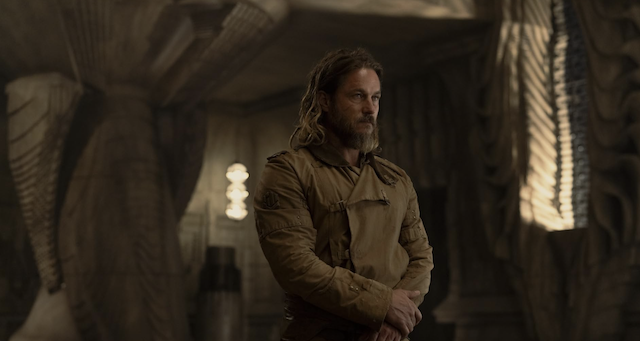
@Courtesy of HBO/MAX
Q: Your character really doesn’t allow her will to be bent, she has an incredibly strong set of convictions. How did you approach playing this side of her?
Emily Watson: She’s very unafraid. Nothing fazes her. Terrible things are happening, people are dying all around her. She’ll be figuring out: “What can I get from this situation? How can I advance the cause? How does that serve me?” She’s very strategic and just super, super smart.
Q: How did you approach the larger scope of the story, along with the intimacy of all the characters at its core?
Alison Schapker: That was definitely a guiding principle for us. Dune needs to be epic but intimate. Part of our job was to create a scope and a spectacle that was immersive, that would make you feel like you were transported somewhere, that would ground our story in a universe that you could believe in. And another part of it was being attentive to our characters and understanding that their relationship to one another onscreen is ultimately what is going to carry us through. You can do all the worldbuilding you want, but if you don’t have your characters on an intimate scale, taking you through the story, it won’t come together. Epic but intimate was our mantra.
Jordan Goldberg: I really can’t say it any better than that. When you’re in the writer’s room, you’ve got to think about the characters first and then you follow the story from there.
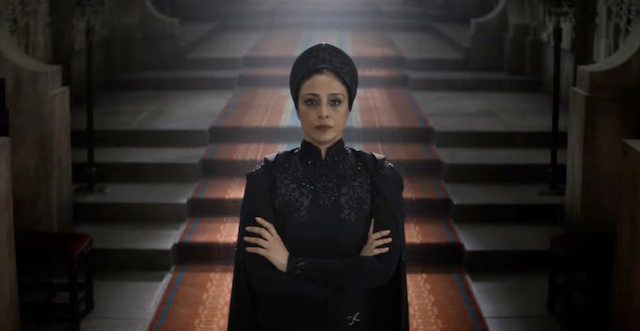
@Courtesy of HBO/MAX
If you like the interview, share your thoughts below!
Check out more Adriano’s articles.
Here’s the trailer of Dune: Prophecy

